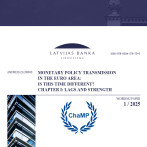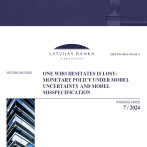Devaluation: the central government budget and debt
The devaluation of the lats will not improve the budget, while the debt will increase At the budget discussions, the misleading statement about the devaluation of the lats as a panacea for improving the budget and avoiding the expenditure cuts (maybe the social expenditure cuts) and, who knows, also the implementation of the long postponed reforms, was recurrently presented.
There is no relation between the devaluation and the necessity to balance expenditure with revenue. How would the devaluation fill the budget gap and would the central government budget revenue increase? The devaluation would again cause a surge in inflation: prices of both the imported goods and services and a bit later also those of domestic products would rise as they also contain imported raw materials and manufacturing equipment; corporate payments for euro loans would grow, too. Thus inflation would seem to enable collecting more indirect taxes - the more expensive the product, the more lats it would bring, e.g. by way of value added tax. However, this is a simplified calculation, as the price rises would result in a notable decrease in the purchasing power, i.e. also in consumption, and the expected tax flow would dry up.
As a result of the devaluation and subsequent inflation, most of the central government expenditure would increase notably.
First, the devaluation means higher expenditure in the budget items depending on imports, e.g. higher fuel prices would result in a rise in prices of such functions that are of vital importance to a country as fire protection and emergency medical service; the medical products for the needs of the hospitalized patients and those paid for from the state budget would become more expensive (and will it still be possible to pay for them from the state budget?): the heating and electricity tariffs would rise as well. At the same time, the EU funding that is so crucial for stimulating the economy would also require more resources. Moreover, would it be possible to provide co-financing for projects whose implementation requires imported resources (e.g. the price of fuel that is needed in road construction would rise)?
Second, if the funds of some budget items are "swallowed up" due to higher prices of imports, it means less funding for other items respectively, inter alia reducing the possibilities to pay salaries and allowances. Even if they were paid in the previous amount, as a result of the devaluation effect the funds that people and institutions receive from the central government budget, including pensions and salaries, would be "swallowed up" by inflation and devalued.
Third, the devaluation means higher public expenditure for the repayment of the debt, as Latvia's external debt and interest payments in terms of lats would increase automatically.
And fourth, the transition to cost-based management is of vital importance to such a small economy depending on external circumstances, so that it could spend and accumulate funds for its needs instead of paying the debt.
Consequently, the devaluation would in no way solve the problem: moreover, filling the budget gap in such a way does not work, as it is obvious that the expenditure would increase, while there is no reason to hope that the revenue would increase, too. The budgetary situation and the welfare of the population would even deteriorate.
Rather than performing some magic tricks, real measures should be taken to balance the budget: the government should adhere to the same principles when planning expenditure as any individual. If a person's expenditure exceeds income, the only real possibility is to work and increase the income or, if it is not possible, to cut expenditure. Obviously it is also possible to borrow the money from a neighbour for some time, but the question is - for how long? If the neighbour sees that the borrower does not manage the money wisely, he/she will either stop lending or set higher interest on the loan, while the borrower will find himself/herself in an even deeper pit.
Latvia seems to be like this person. From 2004 to 2008, it has been raising the expenditure by 20-30% per annum. The revenue also posted buoyant growth; however, it reflected the growth of the overheated economy. It was clear that, with the economy cooling, the revenue would decrease notably even if the downturn were not as rapid as now. However, all revenue was spent recklessly without saving anything for a rainy day, and even borrowing more funds. What should be done if, along with the economic downturn, a part of the income naturally shrinks and there are no savings? Most probably the expenditure should be adjusted to the revenue.
Possibilities to borrow from international institutions enable Latvia to reach a balanced budget in several years rather than in one day.
The European Commission, the IMF, the World Bank and some EU Member States lend money but as lenders they also want to see that the unreasonably high budget expenditure spent in the so called rich years is reviewed; it is in Latvia's best interests to balance the expenditure with the real economic situation gradually. Without receiving the international loan, Latvia would have spent only the funds flowing into its budget. In such a case, a decision would have to be made: whom to pay salaries, pensions and allowances, and who would receive nothing. By paying relatively low interest on the loan, Latvia has acquired time for reforming public expenditure and functions, eventually enabling it to stand on its own feet.
Textual error
«… …»






